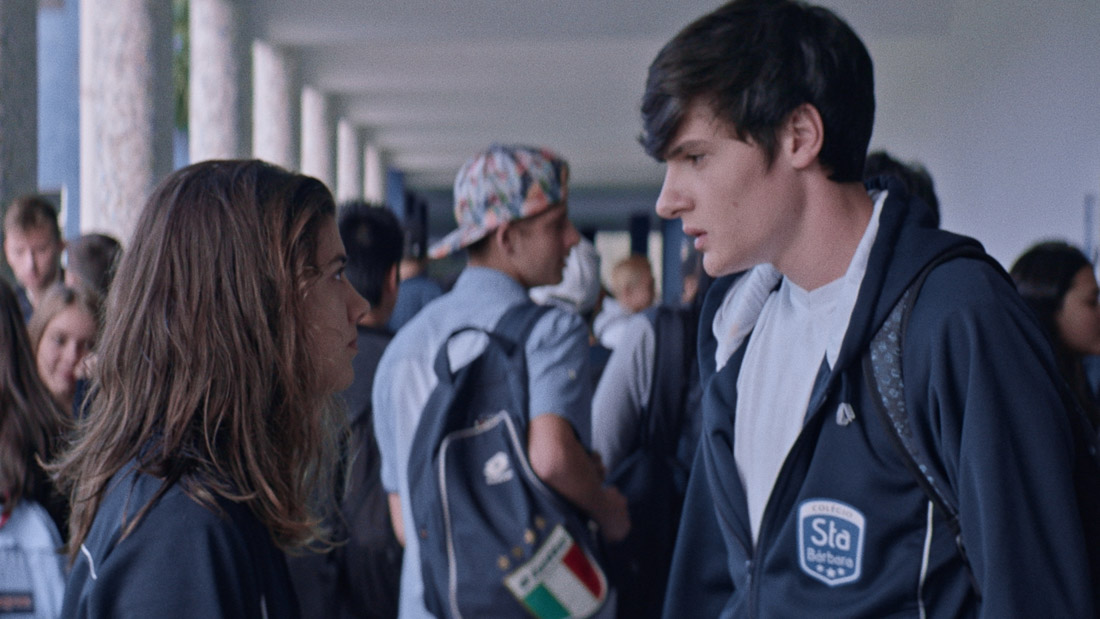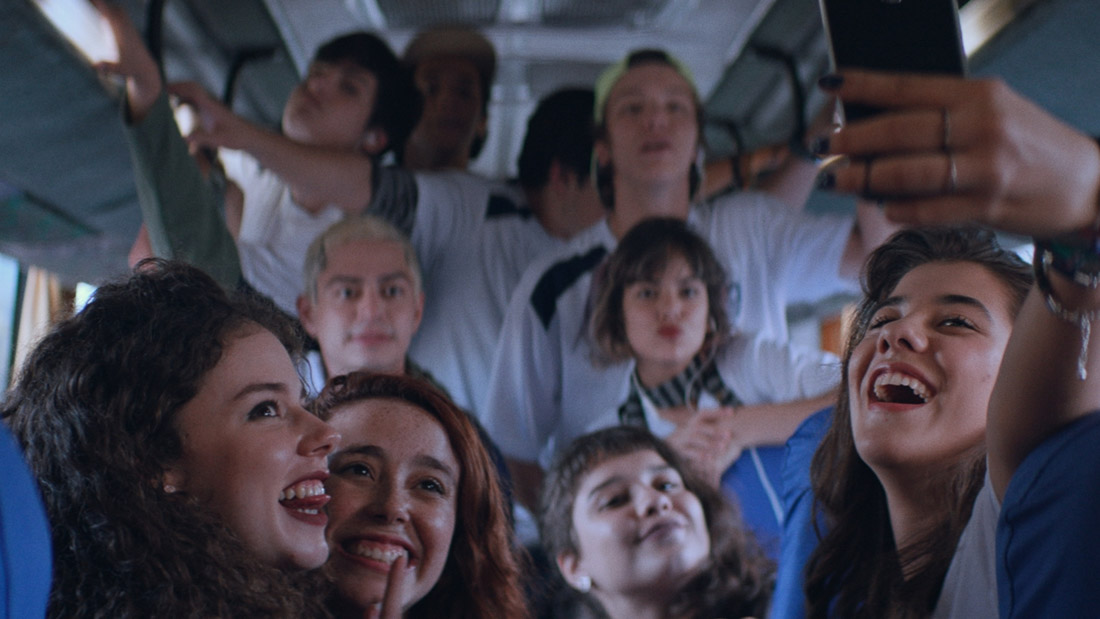The advent of digital forms of communication, including social media, has delivered invaluable assets that have shaped how we interact with each other online; however, it has also produced its own demons driven by the worst in human nature. Trolls that launch hateful attacks from behind a screen or hackers who expose people’s personal information or sensitive images are only two of the internet’s most despicable creatures. With that in mind, Aly Muritiba’s Rust, a Brazilian drama that premiered at the 2018 Sundance Film Festival, hones in on the devastating consequences that these virtual crimes can have on a teenage mind.
Divided into two distinct parts, the film first focuses on Tati (Tifanny Dopke), a young girl invested in creating an attractive online persona. In the aftermath of a breakup, a video of Tati and her ex-boyfriend hooking up is uploaded to the internet by an unknown digital assailant, which wrecks havoc on the girl’s life. Judged, harassed, and disowned by her own friends, Tatit is confronted with a new reality in which she is defined by a clip that people all over school and beyond are watching on their cell phones. As her world crumbles, the intangible act against her takes on real world repercussions. Later, a teenager boy named Renet (Giovanni de Lorenzi) must grapple with his involvement in a tragedy, and is conflicted about whether to follow his father’s old-fashioned understanding of masculine behavior, or to listen to his mother, Raquel (Clarissa Kiste), who advocates for him to admit guilt and take responsibility for his unfavorable choices.
Muritiba, who’s directed a handful of features prior, approaches the socially relevant narrative without sensationalism or moralist simplifications. Cyberbullying is not reduced to an easy discussion on whether it’s right or wrong, the answer is evident, but instead about what incites it and the sequels it leaves behind, the rust that remains. For the director, the starting point in this ongoing conversation should be questioning the accepted notions and parameters of what it means to be a man or a woman, and how each gender is taught to perceive the other. Despite revolving around our digital existences, Rust is visually a movie that takes place in the flesh-and-bone realm. Screens are shown to advance the plot, but the essence of the story is in the subtle performance, the carefully framed shots that slowly reveal their purpose, and its dual emotional perspective. Remezcla dove deep into these themes with director Aly Muritiba at Sundance.
On His Desire to Question How Our Digital Lives Affect Us
Unfortunately there are plenty of stories like this that are happening everywhere. During the process of writing the screenplay, my co-writer and friend, Jessica Candal and I did a lot of research about stories like this that appeared in newspapers and elsewhere, but the actual idea was completely original. It was born of my great desire to speak about the effects that our digital lives have on our real lives. I worked on something similar in the first movie I made titled Para Minha Amada Morta (To My Beloved), and in this new film I developed this theme a bit more.
On How Social Media Has Changed the Teenagers Relationship with the World Today
Social media is a maximized reproduction of real life, so everything is much more intense, especially for teenagers. If people are moved or excited by something you post on social media you feel good, but if people don’t like it you feel really bad. That’s also what happens in real life with the things we do, but in your digital life there are more people and things can be shared with a speed that wasn’t possible when I was a teenager. I lived all of my teenage years in a very small town where everybody knew everything about everyone else’s lives. I remember there was a girl I was in loved with, and she was at a party that I didn’t attend. At the party she hooked up with another guy and she stayed with him. For me, that was like the end of the world, the end of my life, for about two weeks, because everyone in town knew I was a cornudo. I felt terrible. Imagine if this happened to a 14 or 15-year-old boy today but in Facebook where everyone makes fun of everything. Those things affect the person in his or her everyday life outside of the computer.
On Women Being Judged Now Just As They Were Many Decades Ago
We made the film in 2017 and we are now in 2018, and the same things keep happening to women, just as they happened in the 1960s, 1940s, 1930s. For men, being with a girl doing you know what, is seen as a victory by other men and society, and for the girl being with a guy means being dishonored. The world is still misogynistic and machista. It was very important for me to speak from the point of view of these teenagers and from the point of view of the digital universe, about how these ideas have transcended time unfortunately and they are still the same as they were with our parents. There is a scene in which Tati, the protagonists, talks to her ex-boyfriend and he tells her that people are sort of making fun of him, bur for him there are no great consequences. He is calm because he thinks, “I’m a guy that was with a girl, and that’s it.” This is something that is being discussed in my country a lot today, just like in the US now. It’s necessary that we, men, get it together and listen to women, respect women, and let women take the power off of our hands so that we can exist in a better world. It was very important for me to talk about this girl and this woman, who is pregnant in the second half of the film, because they are different versions of women that react differently to a similar situation.

On Why the Adult Female Character in the Film is Pregnant
Raquel’s character shows the attitude of contemporary women who are telling us men, “No more, that’s it. I’m no longer going to allow for you, as man, to think that I, as a woman, have to do what you say.” I think that’s very important for this character. That’s also why the character is pregnant because for me these women in Hollywood who are now talking about sexual harassment, as well as women in Brazil who are fighting for their rights, are the women who are going to the next generation of women, who hopefully will not have to fight against this anymore. They will be much more stronger. I also hope that the men of the next generation are also better.
On Taking Hateful Comments Directly from the Internet
All the comments that appear in the character’s computer in the movie and the part we see in the porn site, that’s all real. All of that comes from the research we did online. Those comments are real comments that people left in videos that emerged from similar stories. Once a video is online there is no more control, the victim loses control of the situation.
On How the Male Characters Represent Different Versions of Machismo
There are three masculine characters that are prominent in the story. All of them portray different characteristics of machismo and in different degrees. The cousin, whose name is Normal, is the kid that nobody cares about. He is always joking around, and he doesn’t think about what others feel. For him, life is just there to be lived and he spends his time making fun of everything. Because of this, he is always speaking from the point of view of machismo. He is doing what groups of men do when they are together. When five or six men are together in a bar having some drinks they say very hurtful things disguised as jokes. That’s what this guy does all the time. Then there is the character of the father, David. He is a much calmer man, and machismo appears in the way he judges his ex-wife, and in him trying to protect his son even though what he did was wrong. There is an implicit type of machismo there. For me the character of Renet, the main boy, is an apprentice. He is reproducing his father’s model of masculinity and his mother arrives to save him from continuing on the path that David is putting him on: judging women and thinking men deserve to have more rights than women. At the same time, it was very important that these characters were very human, so that audiences wouldn’t feel alienated from the second part of the film. It was necessary for audiences to somehow find something relatable in these characters, and that’s why the whole time I tried to make them contradictory, complex and human. The father is doing the wrong thing but for a good purpose, which is to protect his son. The son did something terribly wrong, but he didn’t know the consequences would be so bad. In the second part of the film he realizes, with his mother’s help, that it’s necessary to confront the consequences of his actions to move forward.

On Testing the Film with an Audience of Brazilian Teenagers
The film is coming out in a very timely moment. I remember that during the editing process, the editor and I decided to have a test screening. We showed the film to a group of teenagers at the same school where we shot it. We gathered 100 teenagers to watch the movie, and it was very interesting because during the part where all the memes appear, including those with the Pope and Messi, most of the guys were laughing and the girls were very serious. After the film we had a discussion to hear what they thought of the film, and one of the teenage boys told me, “I feel really bad because I was laughing when that happened to the girl and I thought the memes were very funny, but I now I feel terrible.” Because this happened with at least one boy, then that’s enough for me to feel the movie did something. In that moment I felt, “I have a movie that has made someone feel something.” I think Rust will create a lot of debates and conversations in Brazil. I hope it’s a movie that parents and children watch together to talk about it. I feel very optimistic that the reception there will be positive, especially about how we treated the subject matter
On a Character Committing Suicide in Front of a Camera
For me the decision to throw her life away in front of a camera, and looking at the camera, is very confrontational. It’s like if she is telling us, “You guys want to see blood? That’s what you want? If what you want is a show, here is a show for you. Everyone that watches those types of images, as well as all those that watch them, are equally as guilty. You have to live with this.”







